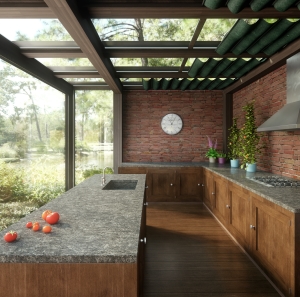Comparing Caesarstone vs Granite for Kitchen Countertops

Caesarstone (Quartz) Countertops
- Looks more modern and has a more controlled design and fluid color.
- A more uniform look with constant color throughout.
- It isn’t just limited to natural colors like granite, so you can choose colors that best fit your decor and style.
Granite Countertops
- Granite is actual stone, so it looks more natural and fits easily into modern, rustic, or any kind of decor or setup.
- Variations in the color, veins, patterns and flecks of natural granite provide a more unique and genuine look.
- Granite has natural visual imperfections, which can be beautiful or not, depending on your personal tastes.
Like granite, Caesarstone surfaces require minimal maintenance to keep the counter looking like new. Just a gentle cleaning with dish soap and water or a mild detergent ensures a long-lasting luster.
There’s no need to wax or seal Caesarstone, although granite does require regular sealing every 5-to-10 years.
What is Caesarstone?
Caesarstone is a brand of top-of-the-line quartz countertop. They are made by a company that has done extensive development and research into making the finest countertops available and who has evolved the process and have become a trendsetter in the field. Their countertops are heat and scratch resistant and carry a lifetime warranty for residential use. Styles run from classic up to contemporary and everything in between.
Founded in 1987, Caesarstone was the pioneer of the natural quartz surfaces market. Although the head office and two manufacturing plants are located in Sdot Yam, Israel, the company does have one manufacturing plant in Richmond Hill, Georgia, USA. So, Caesarstone is available, but not as readily available as granite.
Caesarstone is the first quartz surfacing company to receive ISO 14001 certification (a global standard specifically for environmental protection), ISO 9001 (quality management standard), NSF (public health and safety) certification and the respected Good Housekeeping Seal from Good Housekeeping Research Institute.
Pros:
- Caesarstone countertops can resist stains, scratches and cracks. Most fluids like wine, coffee, soft drinks and even liquid food coloring won’t stain the a Caesarstone surface. Any of these fluids can easily be wiped up using a mild detergent and water.
- Scratch resistant. Although quartz countertops are scratch resistant, they aren’t scratch proof. It is always best to use a cutting board to avoid direct cutting on the surface.
- Nonporous. Caesarstone countertops do not require any type of sealing ever. They are made of a non-porous material, which makes for easy maintenance.
- Food safe. Since quartz is a non-porous surface there is no chance of any food particles working their way into your counter to pose a potential health risk.
- Competitively priced. Although Caesarstone is competitively priced, that price varies from dealer to dealer, and may or may involve installation. Make sure you’re comparing “apples with apples” and get a detailed list of exactly what is included in the price when getting a price for a stone purchase, cut, and installation. The stone may be very inexpensive, but the installation or cost of cutting it may more than make up for it. Know what you’re paying for.
- Caesarstone works well for a variety of sink styles, including farm sinks, vessel sinks, under mount sinks and drop in sinks.
Caesarstone – Cleaning and Maintenance
Caesarstone’s hard, non-porous surfaces are simple to clean and require no sealing to renew their luster. In most cases, soap and water or a mild detergent is enough to keep your Caesarstone surfaces looking like new. If necessary, you can use a non-abrasive soft soap along with a non-scratch or delicate scrub pad, and then rinse with clean water to remove residue.
Caesarstone finishes other than polished may require increased daily maintenance due to their distinctive appearance.
Caesarstone is more heat resistant than other stone surfaces including most granite, marble and limestone; and is not affected by temperatures lower than 150°C (300°F). However, like all stone material, Caesarstone can be damaged by sudden and rapid temperature changes, so the manufacturer suggests using hot pads or a trivet on the surface and recommends that hot pots and pans never be directly placed on the counter. If using appliances such as electric frying pans, crock pots, or roaster ovens trivets or hot pads also be used.
Like all stones, Caesarstone can stain. If used in the bathroom (kitchen too) remember to keep acetyl-based solvents such as nail polish away from the surface; quartz is weak to it. If needed, apply a non-abrasive household cleaner (a non-abrasive cleaner will not dull the surface shine) and rinse to remove residue. For adhered material such as dried food, gum, etc. first scrape away excess material with a plastic putty knife and then use a damp cloth to remove any marks or residual dirt. For extra-stubborn stains, a no-scratch Scotch-Brite® pad is recommended along with the non-abrasive cleaner such as Method Daily Granite.
Natural Granite
Unlike quartz, which is a man-made stone, natural granite is, well, natural. It’s a stone that only Mother Nature makes. But she makes it in far more colors, varieties and differences of hardness than quartz.
Pros of Natural Granite:
- The small crystals embedded in granite change with the light, whether natural or interior lighting, meaning the look and appearance of your stone changes throughout the day according to the lighting.
- Granite countertops are very affordable.
- Natural granite is cool – making it perfect for bakers. If you use it on your floors and don’t like cool – it’s easy to warm up with a heating system.
- You can cut on granite without a cutting board – although fabricators say it’s better to use a cutting board. If your kid makes a sandwich without a board, you’re probably going to be fine.
- Granite can usually be repaired if it’s damaged.
- Hot items such as griddles, fryers, and toaster ovens won’t burn or leave char marks on your granite countertop.
- Each and every granite stone is unique and beautiful. It’s impossible to duplicate the natural, true beauty of granite.
- Granite comes in many different patterns, all unique, and includes veins, specks, and swirls. Granite is colored all the way through.
- Granite works well for a variety of sink styles, including farm sinks, vessel sinks, under mount sinks and drop in sinks.
- There are a variety of sink finishes available to compliment your granite countertops including ceramic, copper, granite composites, stainless steel, granite, onyx, marble, sandstone, limestone and even concrete.
- Natural granite is readily available and you’ll rarely, if ever, have to wait on getting the right stone.
- Granite is a sanitary countertop material that does not harbor bacteria.
- Granite has been around for a very long time and is not a trend. It adds value to any new home or home renovation.
- Granite is strong, hard to scratch and kid friendly. It can be used indoors or outdoors.
- Granite can have arches, curves and 90-degree angles if you want.
- It’s a siliceous stone, meaning it’s not highly susceptible to damage from acids (orange juice, wine, milk etc.) although spills should be cleaned up as they happen.
- Granite is durable. It will last your lifetime and longer.
Deciding which stone is best for you depends on a lot of things, like your budget, how long you expect to live in the home, resale value, home value, and whether you’re choosing to renovate for resale, or for your own enjoyment.
If you’re more concerned about esthetics, i.e. how a stone and the color look, and if they’ll match your room, natural granite has more varieties of color and pattern, while Caesarstone has a limited, but predictable color range and pattern.
Both are excellent stones for homeowners with families. Both are comparable in cost – depending on where you purchase your stone, and what features it has.


